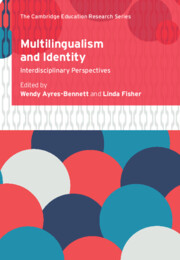Book contents
- Multilingualism and Identity
- Multilingualism and Identity
- Copyright page
- Contents
- Figures
- Tables
- Contributors
- 1 Towards Interdisciplinarity in Multilingual Identity Research
- Part I Situated Multilingualism and Identity
- Part II Multilingual Identity Practices
- Part III Multilingual Identity and Investment
- 13 Multilingualism(s), Globalization and Identity
- 14 Who Are the Multilinguals?
- 15 Multilingual Identity Construction through Participative Reflective Practice in the Languages Classroom
- 16 Young Children’s Language Attitudes with Implications for Identity in a US Dual-Language Immersion Classroom
- 17 Language, Identity and Empowerment in Endangered Language Contexts
- 18 Afterword
- References
- Index
17 - Language, Identity and Empowerment in Endangered Language Contexts
Māori and Guernesiais
from Part III - Multilingual Identity and Investment
Published online by Cambridge University Press: 22 July 2022
- Multilingualism and Identity
- Multilingualism and Identity
- Copyright page
- Contents
- Figures
- Tables
- Contributors
- 1 Towards Interdisciplinarity in Multilingual Identity Research
- Part I Situated Multilingualism and Identity
- Part II Multilingual Identity Practices
- Part III Multilingual Identity and Investment
- 13 Multilingualism(s), Globalization and Identity
- 14 Who Are the Multilinguals?
- 15 Multilingual Identity Construction through Participative Reflective Practice in the Languages Classroom
- 16 Young Children’s Language Attitudes with Implications for Identity in a US Dual-Language Immersion Classroom
- 17 Language, Identity and Empowerment in Endangered Language Contexts
- 18 Afterword
- References
- Index
Summary
This chapter investigates the identities and motivations of learners of small, endangered and minoritized heritage languages, especially adults. Our case studies are from two contexts which have both similarities and contrasts: Guernesiais, a small, highly endangered language in Guernsey, Channel Islands; and Māori, a larger minoritized language spoken in New Zealand. We compare and contrast our findings with regard to salient factors that emerge as adults decide to learn these languages: motivation, identity construction and empowerment. Established frameworks of motivation and identity did not to match our contexts and emerging findings. Many interviewees reported being motivated by a desire to reconnect with roots, or to reclaim elements of their identity or culture which they feel have been denied to them. Our new speakers of minoritized languages actively seek revitalization through language as an enrichment of their individual or group identity, rather than profit- or prestige-related orientations, or lofty yet vague aspirations to ‘save the language’. The concept of muda, or ‘act of identity’ as a pivotal stage in learning a new language, is especially salient to our findings.
Keywords
- Type
- Chapter
- Information
- Multilingualism and IdentityInterdisciplinary Perspectives, pp. 341 - 364Publisher: Cambridge University PressPrint publication year: 2022
- 1
- Cited by

